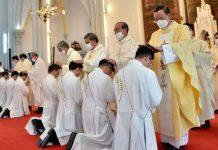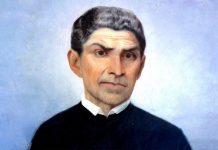Beneath the discreet appearance of a mother of the family, Dona Lucilia’s life was the constant ascent of a soul forged in solitude, pain and devotion to the Sacred Heart of Jesus.
Newsroom (02/05/2024 1:45 PM, Gaudium Press) Lucilia Ribeiro dos Santos was born on 22 April, 1876 in Pirassununga, in the interior of São Paulo, and was baptized on 29 June, with Our Lady of Penha as her Godmother. The daughter of Dr. Antônio Ribeiro dos Santos and Gabriela Rodrigues dos Santos, she was descended from former members of the São Paulo aristocracy.
Childhood surrounded by innocence and faith
Her childhood was particularly marked by the excellent education she received, a mixture of values from Portugal and the splendours of French culture, which governed the traditional families of São Paulo in the 19th century. In Lucilia’s upbringing, refinement and good manners were combined with a broad outlook and a spirit of faith, inherited from the practice of the Catholic religion at home.
Pirassununga appealed to young Lucilia because of its calmness. From an early age, her soul was open to contemplation and prayer, which was helped by the tranquility of her interior. Life away from turmoil formed in her spirit a keen sense of wonder, born of continuous pondering and attention to the facts of everyday life.
Lucilia naturally wrapped the souls and creatures around her in the primal vision of innocence – which she would maintain unscathed throughout her long life – and mythologized them, always considering the qualities of each one. In socializing, she placed everyone in a key of seriousness, distinction and greatness, an inclination that was greatly encouraged by the occasions when the family travelled to little São Paulinho to visit relatives or attend the meetings of the aristocracy, because there she found an elevated manner and good taste.
In 1893 Lucilia moved permanently to São Paulo, when she was seventeen years old. The family took up residence in a mansion in the Campos Elíseos neighbourhood, in the style of the characteristic splendours of the Belle Époque.
A lover of nature, music and poetry
Lucilia’s thoughts remained focused on very lofty considerations, which can easily be seen in the photographs of her that are preserved. Her physiognomy denotes the depth of someone who understood the sublimity of pain, and a constant resignation and conformity to God’s will.
Her ceremonious demeanour blossomed in this key, which she would retain even in her simple home hobbies. Lucilia mastered the piano and the mandolin, as well as enjoying composing poetry or writing down well-known poems to recite during family evenings.
Hiking, horse riding on her father’s farm and contemplating the wonders of the sea on the family’s trips to Santos were also beneficial distractions that brightened her youth, fueling her sense of the supernatural, and which she would later remember with nostalgia.
Home formation and great suffering
During the long hours of prayer in which she placed herself in the presence of God, Lucilia felt a longing for religious life. Providence, however, destined her for marriage, according to her parents’ advice. Dr. Antônio suggested a suitor from an illustrious family in Pernambuco: Dr. João Paulo Corrêa de Oliveira, a skilled lawyer. She agreed to her father’s wish, and on 15 June 1906 the wedding ceremony took place.
The state of marriage would add to Dona Lucilia’s supernatural spirit, as difficulties, disappointments and illnesses took their toll on her as a new wife, housewife and mother. It was in suffering, financial setbacks, family misunderstandings and the isolation caused by not colluding with a society that eagerly welcomed the terrible changes that would characterize the 20th century, that she would reach the pinnacle of herself.
In order to resist the invitations of the world, her life of piety became very fertile, nourished by a particular devotion to the Sacred Heart of Jesus, from which she drew the true torrent of goodness that would indelibly mark her relationship with her neighbour. Over the years, she became so configured to her “Good Jesus” that anyone who approached her had the impression of being enveloped by a special anointing, undoubtedly the fruit of divine grace introduced into the souls of the baptized.
Sublime maternal spirit
Providence blessed the couple with two children, Rosenda and Plinio, on whom the goodness of Dona Lucilia’s heart was poured out. Motherhood brought out one of the most sublime aspects of her soul, allowing her to take her dedication, friendship and understanding to unimagined limits. A heroic example of this was the fact that she vehemently preferred the life of her son Plinio to her own, after realizing that she would run great risks during the pregnancy…
The bonds of her affection, added to her overflowing patience and firm convictions, would always be very dear to those who came close to her. Irreproachable in this respect, Dona Lucilia would also be known in the family as a staunch Catholic, inflexible in matters of morals, an excellent educator in Christian principles, with which she knew how to train her children and help her nephews and relatives.
A legacy left when she crossed the threshold of eternity
Dona Lucilia lived until the eve of her ninety-second birthday, surrendering her soul to God on 21 April 1968. It was an honour and a real cross for her to persevere unscathed in her principles in the midst of a world in deep crisis, which led her to spend the last years of her life in almost complete isolation – only mitigated by Dr. Plinio’s filial solicitude.
Having climbed the ladder of perfection until she achieved full union with the Sacred Heart of Jesus, sublimating herself in her maternal vocation through a constant elevation of spirit, seems to have been the secret of her soul. And it is from this very high vantage point that we can see, without superficiality, the breadth of her figure. The natural qualities of her noble soul, of an exemplary and affectionate nature, plus the supernatural virtues she practiced, make her story immortal, especially for those who have already tasted the sweetness of her protection.
In fact, the proof that Dona Lucilia continues her exquisite maternal mission from eternity is a constant affirmation of those who consider themselves her spiritual children. And each one of them is her most precious legacy to the world.
Text taken from Heralds of the Gospel Magazine no. 268, April 2024. By Sr. Michelle Viccola, EP.
Compiled by Sandra Chisholm
































